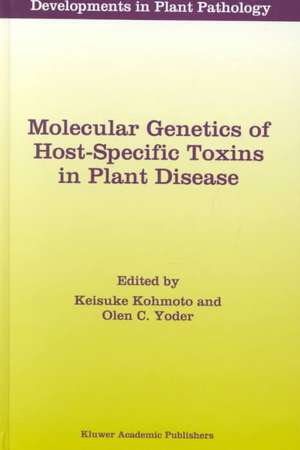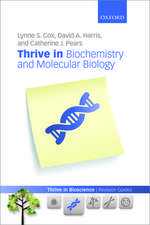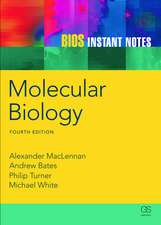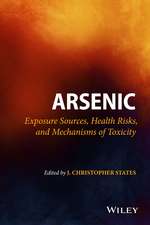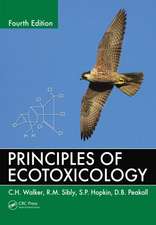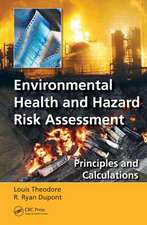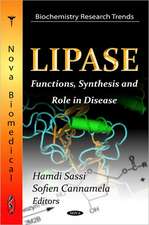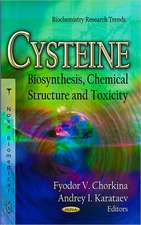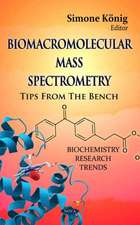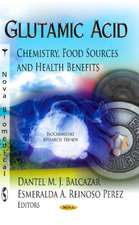Molecular Genetics of Host-Specific Toxins in Plant Disease: Proceedings of the 3rd Tottori International Symposium on Host-Specific Toxins, Daisen, Tottori, Japan, August 24–29, 1997: Developments in Plant Pathology, cartea 13
Editat de Keisuke Kohmoto, Olen C. Yoderen Limba Engleză Hardback – 31 mar 1998
| Toate formatele și edițiile | Preț | Express |
|---|---|---|
| Paperback (1) | 1223.25 lei 6-8 săpt. | |
| SPRINGER NETHERLANDS – 17 oct 2012 | 1223.25 lei 6-8 săpt. | |
| Hardback (1) | 1229.28 lei 6-8 săpt. | |
| SPRINGER NETHERLANDS – 31 mar 1998 | 1229.28 lei 6-8 săpt. |
Din seria Developments in Plant Pathology
- 24%
 Preț: 789.13 lei
Preț: 789.13 lei - 15%
 Preț: 589.97 lei
Preț: 589.97 lei - 15%
 Preț: 584.71 lei
Preț: 584.71 lei -
 Preț: 388.34 lei
Preț: 388.34 lei - 15%
 Preț: 654.30 lei
Preț: 654.30 lei - 15%
 Preț: 587.02 lei
Preț: 587.02 lei - 18%
 Preț: 1819.90 lei
Preț: 1819.90 lei - 18%
 Preț: 1834.90 lei
Preț: 1834.90 lei - 18%
 Preț: 948.47 lei
Preț: 948.47 lei - 18%
 Preț: 952.89 lei
Preț: 952.89 lei -
 Preț: 400.10 lei
Preț: 400.10 lei -
 Preț: 411.64 lei
Preț: 411.64 lei - 18%
 Preț: 945.79 lei
Preț: 945.79 lei - 15%
 Preț: 639.25 lei
Preț: 639.25 lei - 18%
 Preț: 1226.90 lei
Preț: 1226.90 lei - 15%
 Preț: 639.59 lei
Preț: 639.59 lei - 18%
 Preț: 945.62 lei
Preț: 945.62 lei - 18%
 Preț: 1839.95 lei
Preț: 1839.95 lei - 5%
 Preț: 676.20 lei
Preț: 676.20 lei
Preț: 1229.28 lei
Preț vechi: 1499.12 lei
-18% Nou
Puncte Express: 1844
Preț estimativ în valută:
235.24€ • 244.21$ • 196.16£
235.24€ • 244.21$ • 196.16£
Carte tipărită la comandă
Livrare economică 22 martie-05 aprilie
Preluare comenzi: 021 569.72.76
Specificații
ISBN-13: 9780792349815
ISBN-10: 0792349814
Pagini: 415
Ilustrații: XIII, 415 p.
Dimensiuni: 155 x 235 x 24 mm
Greutate: 0.78 kg
Ediția:1998
Editura: SPRINGER NETHERLANDS
Colecția Springer
Seria Developments in Plant Pathology
Locul publicării:Dordrecht, Netherlands
ISBN-10: 0792349814
Pagini: 415
Ilustrații: XIII, 415 p.
Dimensiuni: 155 x 235 x 24 mm
Greutate: 0.78 kg
Ediția:1998
Editura: SPRINGER NETHERLANDS
Colecția Springer
Seria Developments in Plant Pathology
Locul publicării:Dordrecht, Netherlands
Public țintă
ResearchCuprins
Toxin Biosynthesis.- A mechanistic view of the fungal/plant interaction based on host-specific toxin studies.- Function and biosynthesis of trichothecenes produced by Fusarium species.- Enzymology, molecular genetics, and regulation of biosynthesis of the host-selective toxin HC-toxin.- Host-specific toxin deficient mutants of the tomato pathotype of Alternaria alternata obtained by restriction enzyme-mediated integration.- Molecular analysis of AK-toxin biosynthesis in the Japanese pear pathotype of Alternaria alternata.- A catalytic domain of a cyclic peptide synthetase that is specific for the apple pathotype of Alternaria alternata and its possible involvement in host-specific AM-toxin production.- Involvement of host factors in the production of a protein host-specific toxin produced by Alternaria brassicicola.- Structures and biosyntheses of phytotoxins in Cochliobolus spicifer and Bipolaris sorokiniana: C3 Unit addition reaction in phytotoxin biosyntheses.- Versatile synthetic route for AAL-toxins and fumonisins.- Characterization of the thiotemplate mechanisms of syringomycin and syringopeptin synthesis by Pseudomonas syringae pv. syringae.- Effects of Toxins on Plants.- HC-toxin: Does inter-species chromatin remodeling confer host-pathogen compatibility?.- Victorin-induced oat cell death.- Primary effect of a host-selective toxin from Magnaporthe grisea to mitochondria of rice leaves.- The accelerated effects of AK-toxin I on exocytosis and endocytosis of susceptible Japanese pear leaves.- Isolation and mode of action of Ptr chlorosis toxin from Pyrenophora tritici-repentis.- Syringolide derivatives for receptor studies.- Lethal logic in apoptosis: toxins trigger programmed cell death during disease in eukaryotic cells.- Evolution and Genetics of Toxin Production and Pathogenesis.- Evolution of pathogenic and reproductive strategies in Cochliobolus and related genera.- On the phylogenetic correlations of phytotoxins and related metabolites among blast disease fungi.- Cloning and expression of the ToxA gene in Pyrenophora tritici-repentis.- The Ptr necrosis toxin and necrosis toxin gene from Pyrenophora tritici-repentis.- The genetics of pathogenicity in Cochliobolus heterostrophus.- Toxins and other metabolites of Phoma tracheiphila involved in pathogenesis of “mal secco” disease of citrus trees.- Ergopeptine toxins and peptide synthetase genes in clavicipitaceous pathogens and symbionts of plants.- Genetical and physiological studies on the species-specific parasitism of Magnaporthe grisea in gramineous plants with a special reference to a cross between the Triticum isolate and the Setaria isolate.- Sensing, Penetration and Host Degradation.- Signal transduction and gene expression during early stages of fungal phytopathogenesis in the rice blast fungus.- Cell wall degrading enzymes in HST-producing fungal pathogens.- Expression and regulation of melanin biosynthetic genes during appressorium formation of Colletotrichum lagenarium.- Mechanics of invasive fungal growth and the significance of turgor in plant infection.- The involvement of fungal cutinase in early processes of plant infection.- Biochemical and molecular roles of HST and enzymes produced by pathogen of citrus brown spot disease.- Infection behavior of Venturia nashicola and supposed involvement of cell-wall degrading enzymes in the pathogenesis on Japanese pear.- Host components and a complex bacterial sensor kinase, RtpA, determine the pathogenic process of Pseudomonas tolaasii on a cultivated mushroom, Pleurotus ostreatus.- Mechanisms of Plant Resistanceand Susceptibility.- Molecular analysis of the polygalacturonase-inhibiting protein(PGIP) gene family in Phaseolus vulgaris L..- Saponin detoxification and fungal pathogenesis.- The interaction of Alternaria alternata f. sp. lycopersici and its AAL-toxins with tomato.- The oxidative burst system in plants: a strategic signal transduction system for triggering active defense and for parasites to overcome.- Plant cell wall with the suppressor may play a crucial role in determining specificity.- Characterization of the interaction between fungal pathotoxins and URF13, the cms-T maize mitochondrial T-toxin receptor.- Identification of receptor site of the suppressor isolated from Phytophthora infestans in potato plasma membrane by using surface plasmonl biosensor.- Detoxification of mycotoxins in planta as a strategy for improving grain quality and disease resistance: identification of fumonisin-degrading microbes from maize.- Molecular cloning, expression and characterization of recombinant antibody against mycotoxins.- Selection of a resistant mutant to Alternaria blotch in apple and analysis of proteins associated with the susceptibility by 2-D gel electrophoresis.- Several strategies for dissecting and controlling functions in plant cells.
